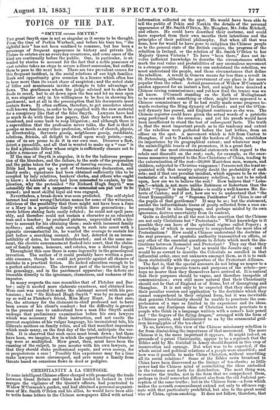TOPICS OF THE DAY.
" SMYTH versus SMYTH."
Tin great Smyth case is not so singular as it seems to be thought. From the time of Perkin Warbeck, and before his time too, " the rightful heir" has not been confined to romance, but has been a personage of frequent appearance in history and private life. Claims to estates are an everyday occurrence, and some cases of the kind are continually before the public. One, in particular, is at- tended by stories to account for the fact that a noble possessor of vast estates takes no steps to secure a direct succession, but suffers them to pass to the next heir. There are two prevalent causes for this frequent incident, in the social relations of our high families. Rank and opportunity give occasion to a licence which often has to bear more than its exact share of suspicimi ; and the noted state of titles and muniments invites attempts to take advantage of flaws. The gentleman whom the judge advised not to show his deeds in court, but to sit down upon the box and let no man open it, was singular only in his willingness to be free in showing his parchment, not at all in the presumption that his documents must contain flaws, It often suffices, therefore, to get anecdotes about well-known families, in order to be supplied with the raw material for a conspiracy like that of the false Smyth. Lawyers have had so much to do with these law papers, that they have sown flaws broadcast, and come back to reap litigation; and although there is a superstition that the profession never talks, the fact is that it gossips as much as any other profession, whether of church, physic, or directorship. Servants gossip, neighbours gossip, confidants, relations, friends, all delight to dwell upon weak points,—nay, some of us are prone to do it in our own case. Discover a flaw, detect .a peccadillo, and all that is wanted-to make-up a " case " is to find a plausible fellow whose origin is sufficiently obscure not to refute a romance of real life.
If the case of Smyth is singular, it is for the ludicrous propor- tion of the blunders, and the failure, to the scale of the preparation and the pains taken for the purpose of insuring success. A family Bible had been got up, a sort of testamentary declaration, and family seals • signatures had been obtained sufficiently like to be accepted by lady relatives, bankers' clerks and others who ought: to know; a tolerable story had been eoneoisated to explain, by im- plication' why the pretended " Sir Richard Hugh Smyth was ostensibly the son of a carpenter—a concealed son put out to be nursed; and most skilful legal aid was engaged. Nevertheless, a break-down was soon predicted. The self-styled baronet had used wrong Christian names for some of the witnesses, oblivious of the possibility that there might not have been a lane or a Mary in a particular family within three generations ; he wrote letters stating facts easily refuted ; he could not spell pass- ably, and therefore could not sustain a character as an educated man and a teacher; he produced pictures, unprovided with a his- tory to account for his obtaining them; seals als with incorrect family mottoes; and, although rash enough to rush into court with ,a gigantic circumstantial lie, he wanted the courage to sustain his part before a searching counsel. At last, detected in an incom- patibility of dates, he turned fainthearted ; and at the same mo- ment, the electric announcement flashed into court, that the claim- ant of family name, honours, and estates, was a detected forger.
Throughout this case there is some ingenuity in the genealogical invention. The author of it could probably have written a pass- able romance, though he could not provide against all chances of mistake in a practical fiction. He lacked education enough to be a perfect adventurer. The cleverest part of the invention lay in the genealogy, and in the parchment apparatus : the defects are traceable directly to the ignorance, clumsiness, and rashness of the impostor.
In many respects the case resembles that of Fletcher and Bar- ber ; only it needed more elaborate exactness, and obtained less. More care was needed to make the claimant accord with his pre- tensions ' • but " Sir Richard Hugh Smyth " was by no means got up so well as Fletcher's friend, Miss Mary Hunt. In that case, too, the attorney for the claimant-in-chief professed not to have been aware of his client's conduct : but the difficulty is greater in the present case to understand how a man like Smyth eould undergo that preliminary examination before his own lawyers which was necessary for their instruction, and not excite the gravest suspicions at his vulgar language, his inconsistent tale, his illiterate mottoes on family relics, and all that manifest imposture which made many, on the first day of the trial, anticipate the ver- dict. It is observed that such cases must break down • but there have been, we imagine, few in which the opportunities for blunder- ing were so multiplied. How great, then, must have been the cunning of the culprit, to pass muster with his own lawyers, so that they should stake professional repute, and even money, for so preposterous a case ! Possibly this experience may for a time make lawyers more circumspect, and save many a family from threats based on conscious flaws in deed or pedigree.


























 Previous page
Previous page